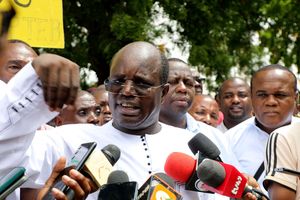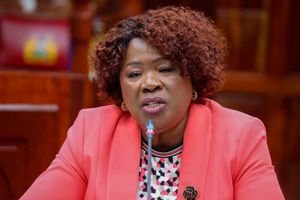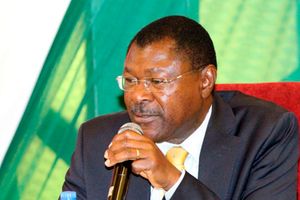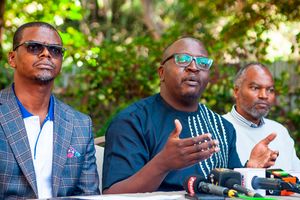
President William Ruto.
President William Ruto is entangled in many battles that could derail the implementation of his pet projects and pit Kenya against its neighbours, even as he continues to face a political rebellion fuelled by his impeached former deputy Rigathi Gachagua.
The provision of universal healthcare under the Social Health Insurance Fund (SHIF) and university education under the new funding model are some of the critical government programmes — with a direct impact on millions of Kenyans — that are currently facing implementation challenges.
A severe health crisis is already unfolding as thousands of patients seeking medical services in private hospitals are being turned away or forced to pay cash after private hospitals began refusing the Social Health Authority (SHA) because of unpaid government debts.
In the education sector, Kenya Certificate of Secondary Education (KCSE) candidates who qualified for university admission in 2024 are yet to choose their courses following the High Court ruling that invalidated the new funding model introduced by President Ruto's administration in September 2023. The court said the model was unconstitutional. The government has been left in the dark, with no alternative system to fund learners in public universities.
However, Government Spokesperson Isaac Mwaura told the Nation that the government is doing everything to address the challenges facing the two critical programmes.
"On Taifa Care (SHIF), we have a Sh39 billion debt and we have cleared Sh8.6 billion. But like all outstanding bills, we need to verify them to rule out fraud. Rupha (Rural and Urban Private Hospitals Association of Kenya) should engage with us in a structured manner as we value their contribution as private stakeholders," said Mr Mwaura.
On the university crisis, Mr Mwaura said the government had appealed the High Court decision and hoped for a positive outcome.
Lasting solution
"In the meantime, let's be patient until the matter is resolved in a timely manner so that no student is adversely affected by attending university. We are keen to find a lasting solution to the way university education is funded," he said.
On another front, key independent institutions in the justice system are currently facing a major onslaught through petitions seeking the removal of Supreme Court judges led by Chief Justice Martha Koome and Director of Public Prosecutions Renson Ingonga.

Supreme Court judges (from left) Isaac Lenaola, Dr Smokin Wanjala, Philomena Mwilu, Chief Justice Martha Koome, Mohamed Ibrahim, Njoki Ndung'u and William Ouko.
In both petitions, President Ruto would have to form a tribunal if the Judicial Service Commission (JSC) and Public Service Commission (PSC) agree to send home the Supreme Court judges and DPP Ingonga respectively.
Although his role is limited to forming a tribunal as required by the Constitution, the perception that high-profile removals require the blessing of those in power can easily be politically weaponised against the Kenya Kwanza regime.
The petitions at the JSC were filed by former Cabinet Minister Raphael Tuju's Dari Limited and lawyers Nelson Havi and Christopher Rosana, while the one against the DPP was filed by Mr Hussein Aila Amaro for dropping a case involving a death threat, which the petition says violates the constitution.
Kenya has also been at loggerheads with its neighbours, particularly Sudan and the Democratic Republic of Congo (DRC), by appearing to take sides in their internal conflicts.
Some of the recent developments, including Kenya's decision to host one of Sudan's warring factions — the paramilitary Rapid Support Forces (RFS) — threaten to undermine Nairobi’s credentials as a regional arbiter and peacemaker.
Sudan's military government, which is fighting for control in a vicious civil war against the RSF), has since warned that it plans to announce measures to source tea from other markets in protest at Nairobi’s hosting of its rivals.
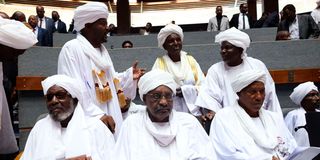
Delegates from Sudan's West Darfur State at the KICC in Nairobi on 18 February 18, 2025, ahead of the planned signing of the Government of Peace and Unity Charter.
Accusing Nairobi of an 'act of hostility', the junta said it would avoid Kenyan tea just days after recalling Sudan's ambassador to Nairobi, Kamal Jabbara, for 'consultations'. RSF and allies civilian groups have announced their intention to form a parallel government. But the Ruto administration has insisted that Kenya remains committed to working with regional bodies, including the African Union (AU) and the Intergovernmental Authority on Development, to support Sudanese-led efforts towards stability.
"When Kenya offers this space, it is without any ulterior motive," said Cabinet Secretary for Foreign Affairs Musalia Mudavadi.
Mr Mwaura told the Nation that Kenya's role "remains to help our neighbours resolve their internal conflicts because we are affected when things don't work properly.
"We have a large refugee population of many nationalities in Kenya. So we remain impartial in the internal affairs of our neighbours. We only host peace negotiations and talks with warring parties as a safe haven that has worked very well in the past," he said. Meanwhile, in Parliament on Wednesday, Health Cabinet Secretary Deborah Barasa had a tough time as senators pressed her for answers over the SHIF debacle.
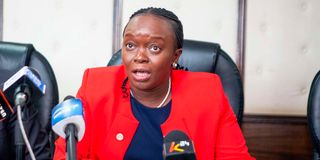
Cabinet Secretary for Health Deborah Barasa addresses journalists at Afya House in Nairobi on January 15, 2024.
Kajiado Senator Seki Lenku asked the CS to explain why civil servants, teachers and police who are injured in the line of duty are denied treatment at private facilities, yet they contribute to SHIF.
His Kirinyaga counterpart, James Murango, also highlighted the plight of teachers in seeking healthcare yet their contributions were being deducted.
"How does it become universal health care if people have to pay a premium to access such a service? We are trying to reinvent the wheel because there is no country in the world where universal healthcare is funded by premiums but by capitation," said Busia Senator Okiya Omtatah.
Senate Majority Leader Aaron Cheruiyot did not mince his words, telling the CS that her ministry had failed Kenyans who expected SHIF to be transformational and change lives.
"You have failed as a ministry. Do not sit in your office and listen to your chorus of civil servants. Come and listen to the people's representatives who are telling you the challenges facing the people," said the Kericho Senator.
In response, the CS said that UHC is not a one-off but a journey and that with limited resources, they are relying on global best practices to ensure that all Kenyans have access to the same health services as the rich.
"We recognise that the private and faith-based organisations are a critical pillar in ensuring that health services are delivered to Kenyans and have had routine meetings to ensure that they support the implementation of UHC," Dr Barasa said.
She added: "We are looking for the money to pay the NHIF debt so that the organisations can provide the critical services that Kenyans need."
Kitui Senator Enoch Wambua told the Nation that Dr Ruto managed to sweep into State House by making lofty promises to improve the lives of the majority poor. He said after more than two years in office, more Kenyans are struggling to meet their needs.
"President Ruto deliberately invoked the name of the Almighty in vain to win the hearts of the suffering Kenyan masses. You can play politics with anyone, but you can't play politics with God. We haven't seen the last of Ruto's antics and with each passing day, it becomes clearer that he is not electable for a second term. It is only by God's grace that Kenya will survive this oppressive and callous regime," said Mr Wambua.
President Ruto's critics, led by Mr Gachagua have seized on some of these challenges facing his administration. For instance, on the plan to remove the Chief Justice and other Supreme Court judges, Mr Gachagua has since warned President Ruto that the populous Mt Kenya region, which was a key plank in his 2022 election, would not forgive him if he allowed Ms Koome to be removed.
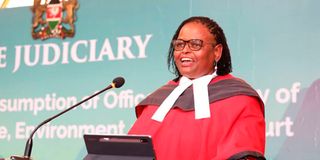
Chief Justice Martha Koome.
"She is being fought because she has refused to be a 'yes sir' person. You chased Rigathi Gachagua and the people of Mt Kenya were silent, you thought they were cowards," Mr Gachagua claimed, adding that the same would not be allowed to happen to the Chief Justice, who comes from Meru. But the deputy president, Prof Kithure Kindiki, told him off for ethicising the matter.
Prof Kindiki said the impeachment of a judge was purely a constitutional matter and not a political or ethnic one.
"The accusers and defenders of the judges must use constitutional and legal arguments to argue their positions instead of trivialising such a weighty legal matter by bringing ethnicity into the equation," Prof Kindiki said.
He asked, "Who will defend the judges who may be innocent but have no ethnic godfathers?"
But in his continued criticism of the administration following his impeachment last year, Mr Gachagua has claimed that little progress has been made since coming into power.
"This affordable housing issue is the worst fraud against Kenyans. These are the things he (Ruto) asked me to defend and I refused. Initially, we believed the President that it was about job creation and it looked good until I discovered that it has nothing to do with housing — it's just business," said Mr Gachagua.
Apart from the Mt Kenya rebellion, Dr Ruto is also facing political headaches following escalating infighting in opposition leader Raila Odinga's ODM.



